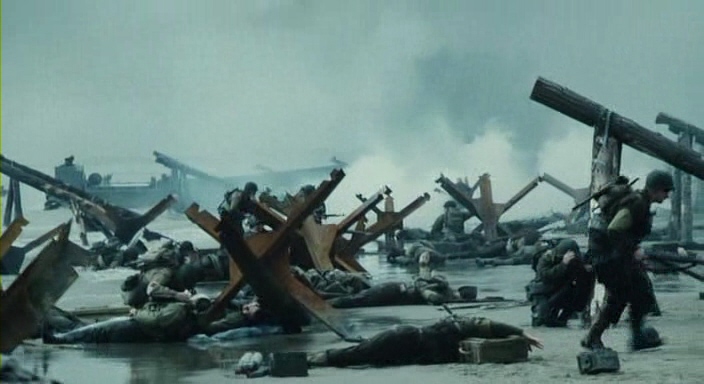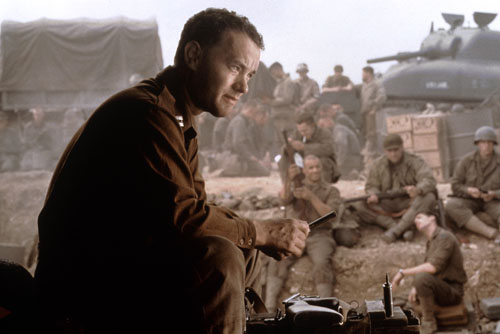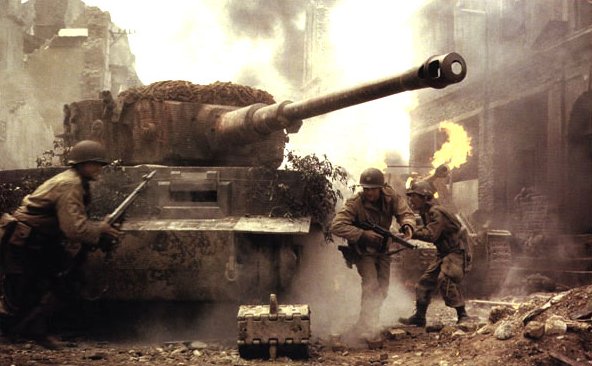Old Stuff
Saving Private Ryan -- 1998
Directed by Steven Spielberg
Little Stevie Spielberg takes one more shot at WW II and finally nails it right between the eyes with "Saving Private Ryan." So far he's tried depicting The Big One as a big joke ("1941"), epic/tragedy ("Schindler's List") and a boy's adventure ("Empire of the Sun"). What sets "Ryan" apart from a run-of-the-mill war film is the terrifying realism of the combat scenes. This is war as pornography -- sickening, upsetting, hellish, chaotic, numbing, alienating and de-humanizing. There's more blood and guts here than in the chum-buckets in "Jaws."

The opening scene "where the men hit the beach" can't be easily forgotten. That and its bookend tank battle almost belong to a different movie than the typical war story that rests uneasily in between. Spielberg blinks and abandons the realism of the first twenty minutes. I'm not giving anything away by saying that the central issue of a war film is the question of who will live and who will die. But because this is also a Spielberg film, it is real obvious who lives and who will get bagged. The main characters are labeled early which ties things up nicely at the end but undercuts the "why did I survive" feeling expressed by many veterans. Survivor's guilt hinges on the knowledge that those who died just happened to be standing in the wrong place at the wrong time. Those left alive are just plain lucky rather than doing anything special to earn their tremendous good fortune.
The story is simple -- A group of army rangers go behind German lines to bring back the sole surviving son of the Ryan family. His three brothers have all been killed in combat in different battles around the world and chief-of-staff George Marshall wants this boy back. No one family should be called upon to pay such high a price.

A tough but sensitive captain (Tom Hanks) is the man chosen for this mission of dubious military value. He's a guy with a mysterious past and an equally mysterious hand tremor. Ted "Frankenstein" Danson has a distracting cameo and Dennis Farina also shows up for an easy paycheck. Ed Burns, Barry Pepper, Adam Goldberg, Jeremy Davies, Vin Diesel, Giovanni Ribisi and Tom Sizemore are Hanks' bickering, melting-pot troopers. Each gets his own little moment to express his feelings about the horrors of war. The weakest part of the movie is the standard telling of how these guys have to put their differences and doubts aside and work together to complete their mission and survive.

The accomplishment of "Ryan" is the way it involves you in the physical space of Omaha Beach and later in the bombed out French towns. The encounters between the Americans and the Germans as they jockey for position, the confusing flip-flop between being the hunters and hunted (the victims and the victimizers) is captured like no other war film. Moral judgments are hard to apply. What are you to think when watching the terrified American GIs scramble as they are machine-gunned in the surf, then later, an American survivor yelling, "Don't shoot 'em, let 'em burn!" as the German defenders make fiery leaps from their burning bunkers or shooting the Germans who do try to surrender?
There's plenty of cruelty and inhumanity to go around on both sides. The differences between the two armies become clear in a subtle, un-Speilberg-like moment. After the carnage of capturing the beach is over, Adam Goldberg's character (Melish) is standing near a trench full of dead Germans where he is handed a Hitler Youth knife by one of those searching the corpses for souvenirs. The Jewish soldier jokes about the blade with its prominent swastika but is suddenly overwhelmed and sobs. It's a great and righteous war to stop an evil empire with the United States clearly on the side of good. This is true and works fine as long as you don't look too closely at the Americans' all white faces. The movie doesn't deal with the reality of "the greatest generation's" racism. The racial "purity" policies of the segregated American armed forces are not a point of debate. In this respect, the Nazis' weren't hypocrites. They literally wore their hatred on their sleeves. The Americans, the white ones anyway, were largely blind to their own institutionalized hate. Non-white American soldiers and the bodies of the French civilians who died under a hail of American bombs and artillery are equally absent in this uncomplicated vision of the invasion of Normandy.
Back to reviewing what the movie is, instead of what it isn't, the biggest compliment I can pay to Spielberg is that intellectually I knew I was watching some actors run around a beach in Ireland in army costumes with some great special effects yet I started to believe that what I was watching was real. -- Rating: $9.50
Tom Graney -- copyright Hollywood Outsider 1998